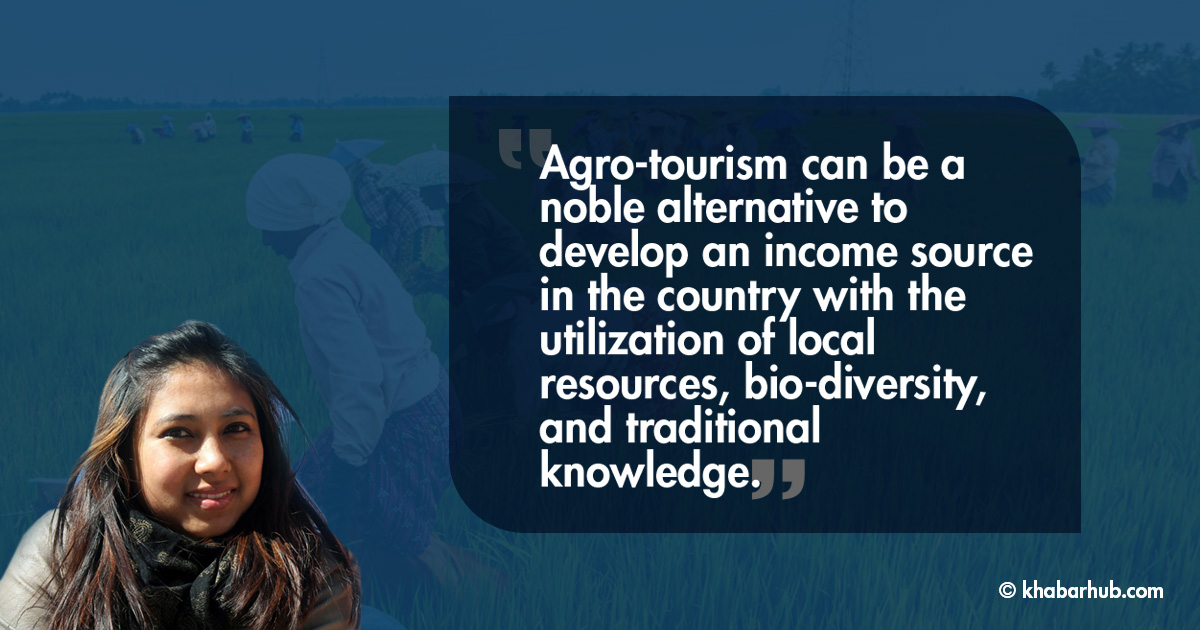Nepal is often called a land-locked but mountainous country for the reason that it carries the pride of having the world’s highest point Mt. Everest along with seven other highest peaks of the world.
Tourism, one of the major sources of revenue and the largest source of foreign exchange in Nepal, is increasing gradually due to its natural beauty, unique culture, and innumerable unique tourist destinations.
According to Wikipedia, the number of tourists visiting Nepal has grown by more than 20% in the past three years.
It plays a vital role in the country’s economy and employment opportunities.
Agriculture, on the other hand, being the main occupation of our country with more than 66% of the population directly involved in farming and sharing roughly 28% of the total GDP, is getting less attention from the past few decades.
The excitement of working in the field is very poor among the youngsters these days.
The policies of the government towards the agro-sector are also limited.
Homestays, on the other hand, is one of the leading socio-economic activities offering from ethnic communities of Nepal which has huge potential to attract tourists as well as be a wonderful exposure to diverse culture exists in our nation.
Agricultural development in Nepal is very critical. Therefore, it is somehow difficult for those hard-working farmers to afford even daily needs because of their low income from their profession.
Every year in the South Asian countries including Nepal, the suicide rate of the farmers is massively increasing due to poor financial conditions.
In other to find the appropriate alternative economic scheme, the blend of agro and tourism sectors naming agro-tourism, rural tourism, or farm-based tourism; can be a unique idea for our country.
Both the sectors can go hand in hand and uplift each other. It is not something very dramatic but a different approach relevant to the welfare of Nepal.
Agro-tourism is one of the fastest-growing sectors in the eco-tourism industry. It is one category of the vacation where global as well as domestic tourists visit the farms and appreciate the ongoing activities in the respective farms and get involved with the local farmers.
Many countries including Italy, Switzerland, Latvia, etc. are popular international tourist stations with countless farming tours available such as grain, vegetable, fruit, dairy and livestock.
As an agrarian country, Nepal shows a high potential for growth towards Agro-tourism and it is also famous for agricultural diversity.
The agricultural area surrounds forestry, fishery, hunting, and farming. The processing of agricultural products, including pulses, jute, sugarcane, tobacco, and grain is also mainly undertaken in the Nepali industry.
Rice, wheat, and maize are the staple food in Nepal. Correspondingly, buckwheat, millet and barley are the main crops grown in high hills.
Terai is known as the storehouse of Nepal since tons of rice are produced there which can be fascinating to tourists.
Several cash crops like citrus, cardamom, coffee, and ginger, and so on are equally significant.
The tea state of Ilam in eastern Nepal is also a focal area to promote Agro-tourism.
Furthermore, livestock farming enhances Agro-tourism. Animals like cattle, buffalo, sheep, goat, cow, pig and poultry including chicken and ducks and many more are domesticated throughout the nation.
Tourists can observe the way of life of those domestic animals and their activities for instance grazing of animals, feeding and milking, management practices from high hills to flatlands.
Agro-tourism in Nepal highlights numerous small areas. For example, the traditional community offers special local food “Dal, Bhat and tarkari”, “Dhindo with Gundruk” and many more prepared by using local spices.
Likewise, small rural businesses which include producing dairy products from Himalayan cattle like Chhurpi (traditional cheese from yak).
There may be risks of an increase in environmental pollutions. It is very important to pay attention to the cleanliness and management of non-degradable wastes in the surroundings.
Homestays, on the other hand, is one of the leading socio-economic activities offering from ethnic communities of Nepal which has huge potential to attract tourists as well as be a wonderful exposure to diverse culture exists in our nation.
Handicrafts and low impact transportation are also other components that boost agro-tourism.
Due to the rapid growth of urbanization in Today’s world and the development of technologies on our planet, many people including the young generation are heading far from agricultural practices.
Several people are still less or unaware of rice cultivation or any type of crop production.
Therefore, Agro-tourism permits tourists to be close with the rural villagers and get experience in agriculture with the farmers in traditional ways.
It also provides tourists a chance to be the witness of rural life and native agricultural practices, like crop harvesting, marketing, preservation, conservation and so on, and to enjoy Nepal differently.
Similarly, they will get to know the local way of cultivating organic vegetables and fruits.
Because of rich agro-biodiversity and variety in geographical landscape, Nepal covers the unlimited scope of agro-tourism. It generates income and employment opportunities for the locals which can be a noble alternative for those Nepalese migrating to a foreign land for better breaks.
Moreover, it also contributes to a particular community by enhancing their culture and creatively combine with agriculture.
It may display a large collection of agro-products and may help in branding local agro-architectural products which can be a good fair trade.
Rather than letting people hop abroad and start something from scratch, our government must always emphasize agro-tourism via local resources and techniques enhancement.
Thus, it can be the way opener to new entrepreneurs from any particular local community.
It also inter-connects between rural and urban citizens economically. Sustainable Agro-tourism promotes the socio-economic aspects of rural areas but also maintains the cultural heritages and takes care of the natural environment.
There may be risks of an increase in environmental pollutions. It is very important to pay attention to the cleanliness and management of non-degradable wastes in the surroundings.
Control of natural hazards must be the mandatory thing with the conservation of greenery in nature for happiness and peace.
In this way, agro-tourism can be the noble alternative to develop income source in our nation with the utilization of local resources, bio-diversity, and traditional knowledge.
It can motivate the upcoming generations to farm and earning organically. Rather than letting people hop abroad and start something from scratch, our government must always emphasize agro-tourism via local resources and techniques enhancement.
This attempt may seem opaque but will be able to bring long term benefits to the people and the nation.
Hence, it is high time agro-tourism would be given major focus and made a prime tool to entice the tourists and foreign currency towards our country.









Comment